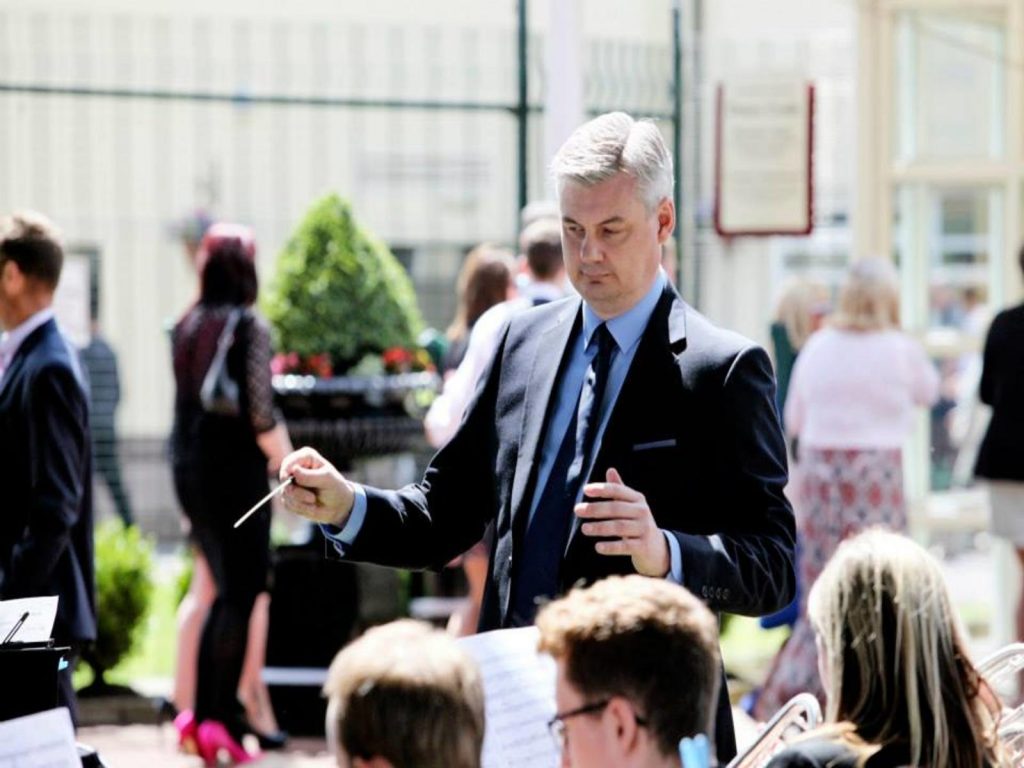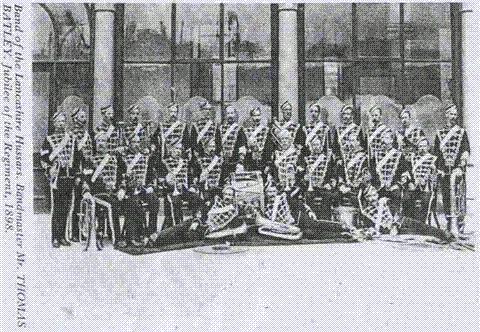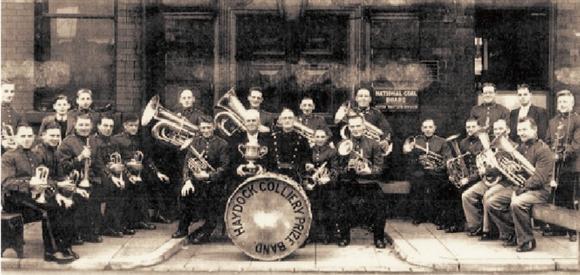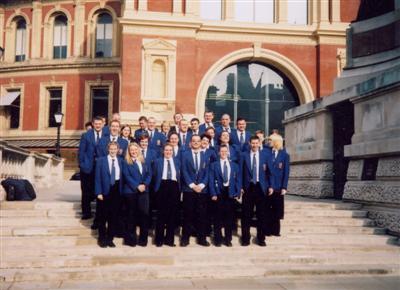Our History
Our Modern Band
 Since 2007, Mark Quinn has been the musical director and the band has seen an unprecedented rise in standards of playing, results in contests and high quality concerts. In this time we have recorded four albums some of which are available on iTunes and can also be seen on our recordings page.
Since 2007, Mark Quinn has been the musical director and the band has seen an unprecedented rise in standards of playing, results in contests and high quality concerts. In this time we have recorded four albums some of which are available on iTunes and can also be seen on our recordings page.
We have competed in two national finals finishing fourth in 2017. We have been crowned North West Area champions and Butlins National Champions.
The band has played at the Grand National and provided the fanfares to start the race, this was played live to 75,000 people and televised to some 600 million people all over the world.
The band regularly plays for the Jockey Club at Haydock Park and Aintree race course and has appeared on Granada reports, ITV and ITV4 in 2018 and 2019.
We have completed many arts projects collaborating with many artists including Heart of Glass in St Helens. We have also played in professional theatre productions of Brassed off at Manchester Palace Theatre, Liverpool Playhouse, Wigan Little theatre and The Blackpool Grand theatre.
It’s fair to say our musicians are very adaptable and enjoy a wide range of activities as members of The Haydock Band.
The Beginning...
 In 1849, Sir John Gerard began a regiment of the Lancashire Hussars. William Cansfield “The Second Barron Gerard” was an officer in the Second Life Guards and Colonel in the Lancashire Hussars, one of the finest Yeomanry Corps in the North of England, mostly drawn from the Gerard Estate.
In 1849, Sir John Gerard began a regiment of the Lancashire Hussars. William Cansfield “The Second Barron Gerard” was an officer in the Second Life Guards and Colonel in the Lancashire Hussars, one of the finest Yeomanry Corps in the North of England, mostly drawn from the Gerard Estate.
His men took part in the Boer War, (1899-1900) and the local regiment played a brave part in the 1914-18 war, where Lord Gerard won the D.S.O. It was from “Lord Gerard’s Hussars Band” that “The Haydock Band” was formed in 1861.
At one time, the Gerard’s owned a considerable amount of land in various parts of England. Locally named places are Gerards Bridge and Gerards Hall in St. Helens.
There is also a Gerard Street in Ashton and there was once a Gerard Arms. Some of the wealth of the Gerard’s came from the coal dug up on their land and were helped by the building of the Sankey Brook Canal in the 18th Century. Coal mining became an important part of the history of Haydock Band.
The Colliery Years
 With the introduction of the mining industry into Haydock, the band was adopted by the Colliery and incorporated the name Colliery into its title and so became known as the “Haydock Colliery Band”.
With the introduction of the mining industry into Haydock, the band was adopted by the Colliery and incorporated the name Colliery into its title and so became known as the “Haydock Colliery Band”.
One of the earliest recorded pieces of history associated with Haydock Band is the Wood Pit Explosion in 1868. There were one hundred and eighty nine victims of the explosion.
The victims were buried at St. Thomas’ Church of England Ashton, St. Oswald’s Roman Catholic Church Ashton, St. James’ Church of England Haydock, Wargrave Cemetery (Newton le Willows) Earlstown, St. Helens or Mold in North Wales.
One of the victims was Thomas Skidmore, aged 24 years, Of Twenty Eight Row, Haydock. He was a drawer to William Turncock and identified by John Evans. He was member of the Haydock Colliery Brass Band and was buried at St. James’ with his instrument placed on top of the coffin, on June 12th 1878.
A long standing association between pit and band was to follow, testimony to this can be found on the engraving on some of the old instruments which had the name of the pit owner “Richard Evans” and read “Richard Evans Colliery Band”.
Two well known names within the history of mining in Haydock are “Thomas Legh Esq”. Lord of the manor and “Richard Evans” of Haydock Grange, both families owned mines. Two buildings still stand today, “Richard Evans School” and the “Haydock War Memorial Library” which was built by the Legh family.
Coal has been mined in Haydock in some fashion for over 450 yrs. The township we know today was built from the production of coal. Coal attracted people, produced work and created a close knit mining community. It was the link with the Cheshire salt trade that caused a massive increase in the production and attracted the attention of local land owners.
In 1784 the Liverpool dock engineer Henry Berry took on the task of making the Sankey Brook navigable. This opened up the rest of the south west section of the Lancashire coalfield to the salt fields and Liverpool.
Throughout this time of industrial activity and expansion the people who were involved in mining in the Haydock area were the Legh’s of Lyme. They were local landowners who had owned Haydock since the beginning of the fifteenth century and so changed Haydock into a mining village. In the 1830’s the Legh’s sold the Haydock mines to Richard Evans and William Turner.
Haydock was quite unique for a small village because it had not just a “Brass Band” but a “Royal Air Force” base and a “British Legion”, so this made up a grand Remembrance Day parade together with members of the Haydock council. The “Haydock War Memorial Library” built by the Legh’s family was the centre of the Remembrance Day, with Last Post and laying of wreaths.
Family links with the British Legion and Band existed between Stan Gardner the present President of the band and retired Solo Trombone and his father Chairman and Standard Bearer of the “Haydock British Legion”. Today the “Haydock Council”, “Royal Air Force” and “Haydock British Legion” no longer exist in Haydock.
The “Haydock Colliery Band” practised for some 80 years in the colliery stable yard canteen. Two of the local conductors were “Tom Mullin” and “Jim Stevens”. In 1912 “J.A.Greenwood” a composer and conductor of note, conducted the band at “Belle Vue” and took 2nd place. In 1917 he won on the test piece “A Souvenir of Gounod”.
More Recent Times...
 Since the early 1990s, Haydock Band has gradually worked its way up through the sections from the 4th section.
Since the early 1990s, Haydock Band has gradually worked its way up through the sections from the 4th section.
A particular high-point in the band’s long history came in 2003, when Haydock Band qualified for the National Finals (Championship Section) at The Royal Albert Hall, London, following a third place at the North-West Regional Contest held in Blackpool.
ABOUT US
Haydock Band is the oldest community run organisation in St Helens. Established in 1861, we have been providing music and tuition to our community for over one hundred and fifty years.
